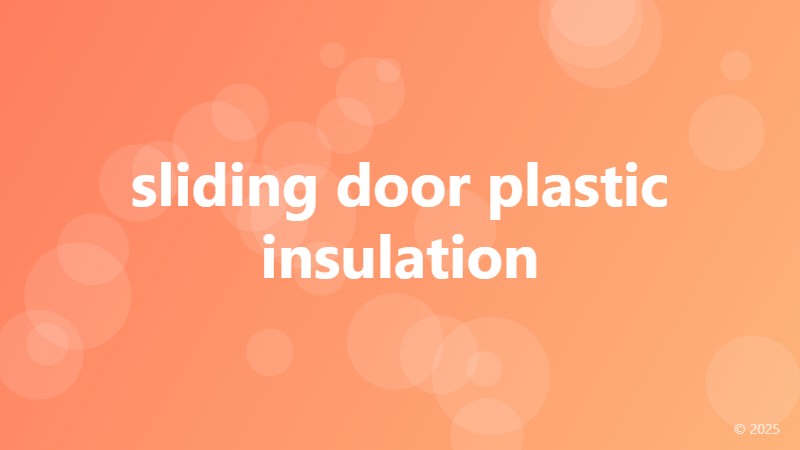sliding door plastic insulation

The Importance of Sliding Door Plastic Insulation
When it comes to energy efficiency and comfort in our homes, one often overlooked aspect is the insulation of sliding doors. Sliding doors are a popular choice for many homeowners due to their aesthetic appeal and functionality. However, they can also be a significant source of heat loss and gain, making our homes less energy-efficient and increasing our energy bills. This is where sliding door plastic insulation comes in – a simple yet effective solution to reduce heat transfer and keep our homes comfortable.
How Sliding Door Plastic Insulation Works
Sliding door plastic insulation is a type of thermal break that is installed between the sliding door frame and the surrounding wall. It is typically made of a durable, weather-resistant plastic material that is designed to reduce heat transfer between the door and the surrounding environment. By creating a barrier between the door and the wall, the insulation helps to reduce heat loss in the winter and heat gain in the summer, resulting in a more energy-efficient home.
Benefits of Sliding Door Plastic Insulation
There are several benefits to installing sliding door plastic insulation in your home. Some of the most significant advantages include:
- Energy Efficiency: By reducing heat transfer, sliding door plastic insulation can help to lower your energy bills and make your home more energy-efficient.
- Comfort: By keeping the warm air in and the cold air out, sliding door plastic insulation can help to create a more comfortable living space.
- Noise Reduction: Sliding door plastic insulation can also help to reduce noise pollution by creating a barrier between the door and the surrounding environment.
- Durability: Sliding door plastic insulation is designed to be durable and long-lasting, making it a worthwhile investment for any homeowner.
Types of Sliding Door Plastic Insulation
There are several types of sliding door plastic insulation available on the market, including:
- Foam-based insulation: This type of insulation is made from a foam material that is inserted into the gap between the door and the wall.
- Fiberglass-based insulation: This type of insulation is made from fiberglass materials and is often used in conjunction with a foam-based insulation.
- Vinyl-based insulation: This type of insulation is made from a durable, weather-resistant vinyl material that is designed to withstand the elements.
Conclusion
In conclusion, sliding door plastic insulation is a simple yet effective solution to reduce heat transfer and keep our homes comfortable and energy-efficient. By understanding how it works, the benefits it provides, and the types available, homeowners can make an informed decision about whether or not to install sliding door plastic insulation in their homes.